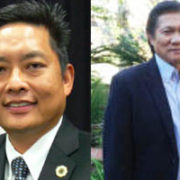CALIFORNIA Gov. Jerry Brown on Saturday, Oct. 3, signed into law a measure aimed at eliminating racial and identity profiling in law enforcement.
AB953 enacts the Racial and Identity Profiling Act of 2015, which requires that law enforcement officials gather and release data on all stops made, that they abide by a revised definition of racial profiling – racial or identity profiling, and that a State Racial and Identity Profiling Advisory (RIPA) Board be established to oversee the execution of the law and analyze the data.
A statewide coalition took to the front of the 77th Division LAPD station in South Central Los Angeles on Wednesday, Oct. 7, to inform law enforcement agencies about the upcoming changes. Family members and friends of individuals killed by law enforcement and youth who have regularly been subject to racial profiling were among people present at the police station and expressed thanks for the bill’s passage.
“[Racial] profiling really goes on…throughout the streets of L.A… every day,” said Brandy Brown, a friend and neighbor of Ezell Ford, a black man who was shot and killed by law enforcement in August 2014. “Our lives are numbered every day we get up in the morning to get dressed for school or wherever we’re going.”
“I thank God that I’m able to stand here today and work on AB953 and thank God that AB953 passed because maybe we would have more lives saved because of [it],” she said.
Under the new law, authored by Assemblywoman Shirley Weber (D-San Diego), agencies must report information about stops made, including: the time, date and location of the stop; the reason for the stop; the outcome of the stop, such as a citation or arrest; the warning or violation cited if a warning or citation is issued; the offense charged if an arrest is made; and race or ethnicity, gender and approximate age of the individual stopped, based on the perception of the peace officer who makes the stop — this data cannot be requested from the person stopped.
Mariella Saba with the Stop LAPD Spying Coalition cited data indicating that African Americans are the most affected by racial profiling. Additionally, she said that of 300 to 400 racial profiling complaints filed with the City of Los Angeles, the LAPD says zero are sustained on a yearly basis. Saba also cited a statistic stating that since the beginning of the year up until Oct. 3, when the bill was signed into law, 881 individuals have been killed by police.
“So that’s what moves us to be here because these issues are very serious and we know that this is a tremendous step, passing this bill. But it’s a step and the accountability, the internal process that is going to have to happen within the department to really address racism…. It’s going to have to be a deep long process,” she said.
AB953 stipulates that agencies employing 1,000 or more peace officers will be required to submit its first round of reports no later than April 1, 2019. With the LAPD employing approximately 9,000 sworn officers, according to its website, the agency will be subject to the 2019 deadline.
While Asian Americans are not affected by profiling to the same extent as African Americans and Latinos, Betty Hung, policy director at Asian Americans Advancing Justice – Los Angeles, said AB953 is important to all Californians.
“Racial and identity profiling and police brutality are issues that affect all communities but disproportionally affect Black and Latino communities. So we believe very strongly that it’s important to stand up for Black Lives Matter and also recognize that by addressing racial profiling and racial discrimination, that can strengthen and expand our democracy for everyone, including Asian Americans,” she said.
The RIPA board will include up to 19 members, including but not limited to: the Attorney General, president of the California Public Defenders Association, the Commissioner of the California Highway Patrol, or their designees. A university professor specializing in policing, and racial and identity equity, two religious clergy members specializing in addressing and reducing racial and identity bias toward individuals and groups; and two representatives of human or civil rights tax-exempt organizations specializing in civil or human rights are also among others who will participate in the board.
At the end of Monday’s press conference, Pastor Cue Jn-Marie from The Row Church applauded members of the South Central community for speaking out and advocating for AB953.
“They say the voice of the people in South Central don’t make a difference. Well we’re here to tell you it did make a difference…. In our communities, this is not a war zone. We don’t want to be treated like a war zone. We care about the public’s safety, and we’re here to say that we need to re-imagine and redefine public safety. But we can’t do it with the old paradigm of racism and racial profiling,” he said.
Organizations that cosponsored AB953 include Asian Americans Advancing Justice – Los Angeles, American Civil Liberties Union of Southern California, L.A. Voice and the Youth Justice Coalition.







